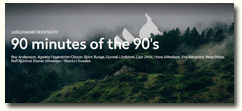|

|
10:10
(Short Film - 2000)
|
ROLE: Magnus
GENRE: Drama
COUNTRY: Sweden
PREMIERED: January 29, 2000
|
 |
|
|
|
|
Synopsis |
|
The management behind the Göteborg
Film Festival got the idea for the relay movie "90
Minutes of the 90's" during the festival in 1989. The
idea was that Sweden would be depicted year by year by
ten filmmakers in about nine-minute-long short films.
The premiere of the final product, a feature film in ten
parts, would take place in 2000. "10:10", in which
Michael starred, was the final film of the project.
The interest among the films turned out to be very
large, and as a partner, the Swedish Film Institute and
Sveriges Television in Gothenburg were chosen. Annually,
SVT showed the project's current 90's film. In addition,
all relay films were shown each year as part of the film
festival's program. |
|
|
|
Film Details |
|
Cast
Cecilia Bergqvist - Bosses tjej
Anita Bornebusch - Ingrid
Björn Ekelöf - Torsten
Cecilia Frode - Anki
Maria Heiskanen - Kia
Rebecka Hemse - My
Björn Kjellman - Gustav
Kjell Lennartsson - Holger
Ulla-Britt Norrman-Olsson - Berit
Michael Nyqvist - Magnus
John Svensson - Bosse
Beata von Oelrich - Angelica
* * * * *
Director - Daniel Alfredson
Cinematography - Peter Mokrosinski
|
|
Commentary |
|
Gunnar Bergdahl, Festival Director (1994-2002):
An impossible project. Which nevertheless was to be. The
Festival (the idea was born out of conversations between
Freddy Olsson and yours truly) mirrored a passing decade
as part of our growing focus on Swedish film.
SVT screened the films and the Swedish Film Institute
funded Roy Anderson's terse aesthetic rebirth, Agneta
Fagerström's dysfunctional family, Björn Runge's racists
on the beach, Gunnel Lindblom's profetic reflection,
Lisa Ohlin's dreamlike celestial journey, Hans
Alfredson's fairytale, Eva Bergman's restaurant kitchen
culture clash, Reza Parsa's solidarity with '90s kids,
Rolf Börjlind's theatrical expressionism and Daniel
Alfredson's summarizing final note. Disparate? No doubt!
Seen in that light, it was a fragmentation typical of
the times. But seen through the lens of the time that
has passed, we also glimpse the key to our own history
after the facts: climate crisis, racism and human rights
turned into political commodities. |
|
|
|
|
|
 |
|
|
|
|
|